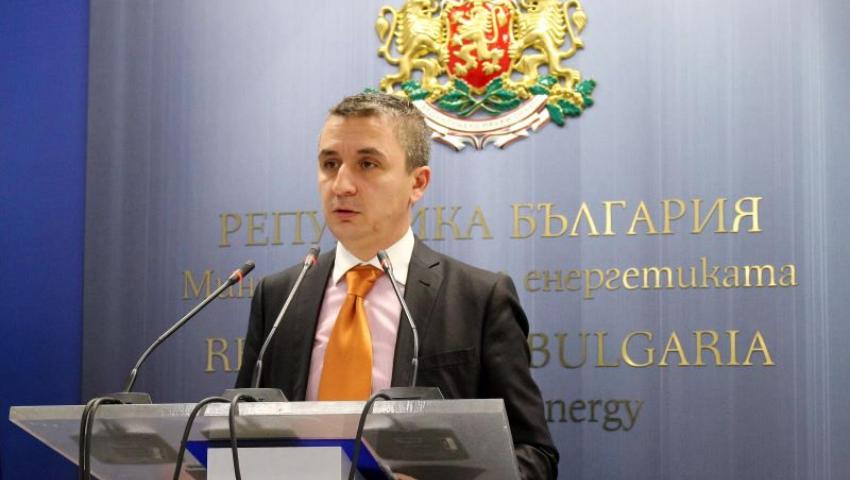Alexander Nikolov: Bulgargaz has had the opportunity to receive the full volumes of natural gas agreed with Azerbaijan
GDNP and SANS joined Bulgargaz to investigate speculative gas resale

Source: press center of the Ministry of Energy
GDNP and SANS joined Bulgargaz to investigate speculative gas resale. Various documents are seized. SANS and police officers have entered a total of six addresses, including private companies in various cities. The management of Bulgargaz stated that they have been checked many times and will cooperate.
Meanwhile, in response to a written question from Energy Minister Alexander Nikolov to Democratic Bulgaria MP Ivaylo Mirchev, he claims that Bulgargaz had the opportunity to receive the full volume of natural gas from Azerbaijan.
Bulgargaz has had the opportunity to receive the full volumes of natural gas agreed with Azerbaijan, the minister said in response to the MP's question whether the reasons why Bulgaria does not receive the agreed amount of Azerbaijani gas are being investigated and whether a connection between the interconnector IGB, which is systematically slowed down so as not to import the full volume of Azeri gas.
Alexander Nikolov clarifies that according to the contract between Bulgargaz and Azerbaijan Gas Supply Company (AGSC), IGB (Greece-Bulgaria gas interconnection) is one of the points for natural gas supply. According to him, however, this does not mean that Bulgargaz did not have the opportunity to receive the full volumes of natural gas.
"As a result of all actions taken by Bulgargaz, including the annexes to the original supply contract, the situation is such that the delivery of full quantities of natural gas to date requires the explicit consent of AGSC," added Minister Nikolov.
According to the agreement, the Azerbaijani company must supply Bulgaria with 1 billion cubic meters of natural gas a year.
As the Minister of Energy clarified once again, negotiations are currently underway with the Azerbaijani side at the highest governmental level on the possibilities for delivering the full agreed volumes on alternative routes.
As it is known, Bulgargaz has repeatedly published its official position on gas supplies from Azerbaijan, which is based on the contract with the Azerbaijani company, and according to which the only route for the supply of Azerbaijani natural gas to Bulgaria is the IGB pipeline (Greek interconnector). -Bulgaria), which is not built.
In 2020, the Azeri supplier informed Bulgargaz that it was starting deliveries on the Trans-Adriatic Pipeline to the Komotini IGB connection point, but the IGB pipeline was not built. "In this situation, Bulgargaz EAD not only cannot receive natural gas under the contract, but is also threatened by penalties," the public supplier wrote at the time. According to Bulgargaz, the Azerbaijani company, for its part, is neither obliged to supply gas through a pipeline other than the IGB, nor to supply all the quantities it would supply via the IGB. After the launch of the IGB gas pipeline has been postponed several times, Bulgargaz EAD had no choice but to negotiate with the Azerbaijani side and seek the best possible interim solution with the explicit consent of the supplier. Bulgargaz EAD has managed to negotiate with the Azerbaijani supplier to receive gas on another gas pipeline, located nearly 300 km from the IGB (via the Greek gas transmission network DESFA).
At present, Bulgargaz EAD receives the quantities that the Azerbaijani supplier has agreed to deliver. Obtaining the full amount of the contractual quantities of the alternative gas pipeline depends entirely on the will and capabilities of the Azerbaijani side, according to the Bulgarian public supplier.
MP Ivaylo Mirchev also raises the question of whether the decision of Bulgargaz to reduce the reserved quantities in the Greek transmission system from 14,400 to 10,000 megawatt hours at the entry point of the TAP gas pipeline in the Greek system - Nea Mesemvria, which will last until June 2022 as capacity shortages have not been identified. He asks if this proves intent in the actions of Bulgargaz.
From the point of view of the Ministry of Energy, there is no objective reason to reduce the agreed quantities from 14,400 to 10,000 megawatt hours per day, said Minister Nikolov. He added that for this reason the ministry, together with the Bulgarian Energy Holding, is clarifying the reasons for Bulgargaz's actions.
